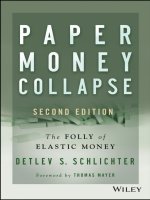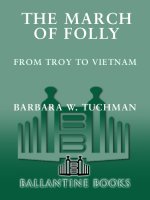Carnacs folly
Bạn đang xem bản rút gọn của tài liệu. Xem và tải ngay bản đầy đủ của tài liệu tại đây (791.55 KB, 178 trang )
TheProjectGutenbergEBookofCarnac'sFolly,Complete,byGilbertParker
ThiseBookisfortheuseofanyoneanywhereatnocostandwith
almostnorestrictionswhatsoever.Youmaycopyit,giveitawayor
re-useitunderthetermsoftheProjectGutenbergLicenseincluded
withthiseBookoronlineatwww.gutenberg.net
Title:Carnac'sFolly,Complete
Author:GilbertParker
ReleaseDate:October18,2006[EBook#6299]
LastUpdated:August27,2016
Language:English
***STARTOFTHISPROJECTGUTENBERGEBOOKCARNAC'SFOLLY,COMPLETE***
ProducedbyDavidWidger
CARNAC’SFOLLY
ByGilbertParker
CONTENTS
CHAPTERI.INTHEDAYSOFCHILDHOOD
CHAPTERII.ELEVENYEARSPASS
CHAPTERIII.CARNAC’SRETURN
CHAPTERIV.THEHOUSEONTHEHILL
CHAPTERV.CARNACASMANAGER
CHAPTERVI.LUKETARBOEHASANOFFER
CHAPTERVII."ATOURPRICE?”
CHAPTERVIII.JOHNGRIERMAKESANOTHEROFFER
CHAPTERIX.THEPUZZLE
CHAPTERX.DENZILTELLSHISSTORY
CHAPTERXI.CARNAC’STALKWITHHISMOTHER
CHAPTERXII.CARNACSAYSGOOD-BYE
CHAPTERXIII.CARNAC’SRETURN
CHAPTERXIV.THEHOUSEOFTHETHREETREES
CHAPTERXV.CARNACANDJUNIA
CHAPTERXVI.JOHNGRIERMAKESAJOURNEY
CHAPTERXVII.THEREADINGOFTHEWILL
CHAPTERXVIII.AGREATDECISION
CHAPTERXIX.CARNACBECOMESACANDIDATE
CHAPTERXX.JUNIAANDTARBOEHEARTHENEWS
CHAPTERXXI.THESECRETMEETING
CHAPTERXXII.POINTTOPOINT
CHAPTERXXIII.THEMANWHOWOULDNOT
CHAPTERXXIV.THEBLUEPAPER
CHAPTERXXV.DENZILTAKESAHANDINTHEGAME
CHAPTERXXVI.THECHALLENGE
CHAPTERXXVII.EXIT
CHAPTERXXVIII.AWOMANWRITESALETTER
CHAPTERXXIX.CARNACANDHISMOTHER
CHAPTERXXX.TARBOEHASADREAM
CHAPTERXXXI.THISWAYHOME
CHAPTERXXXII."HALVES,PARDNER,HALVES”
CHAPTERI.INTHEDAYSOFCHILDHOOD
“Carnac! Carnac! Come and catch me, Carnac!” It was a day of perfect
summerandhopeandhappinessinthesweet,wildworldbehindthenearwoods
andthefarcircleofskyandpineandhemlock.Thevoicethatcalledwasyoung
andvibrant,andhadinitthesimple,truesoulofthings.Ithadtheclearnessofa
bugle-call, ample and full of life and all life’s possibilities. It laughed; it
challenged;itdecoyed.
Carnacheardthesummonsanddidhisbesttocatchthegirlinthewoodby
thetumblingstream,wherehehadformanyanhouremptiedouthiswayward
heart;wherehehadseenhisfather’slogsandtimberscaughtinjams,hunched
up on rocky ledges, held by the prong of a rock, where man’s purpose could,
apparently, avail so little. Then he had watched the black-bearded river-drivers
with their pike-poles and their levers loose the key-logs of the bunch, and the
tumbling citizens of the woods and streams toss away down the current to the
widerwatersbelow.Hewasonlyaladoffourteen,andthegirlwasonlyeight,
butshe—Junia—wasasspryandgracefulabeingaseverwoketheechoesofa
forest.
He was only fourteen, but already he had visions and dreamed dreams. His
father—John Grier—was the great lumber-king of Canada, and Junia was the
childofalawyerwhohaddonelittlewithhislife,buthadhadgreatjoyofhis
twodaughters,whoweredeartohimbeyondtelling.
CarnacwasoneofNature’sfreaksoraccidents.Hewasphysicallystrongand
daring,but,asaboy,mentallyhelackedconcentrationanddecision,thoughvery
clever.Hewasledfromthingtothinglikearayoferrantlight,andhedidnot
put a hand on himself, as old Denzil, the partly deformed servant of Junia’s
home,saidofhimonoccasion;andDenzilwasamanofparts.
DenzilwasnotfarfromthetwowhenJuniamadeherappealandchallenge.
He loved the girl exceedingly, and he loved Carnac little less, though in a
differentway.DenzilwasFrenchoftheFrench,withhabitofmindandcharacter
whollyhisown.
Denzil’sheadwassquatuponhisshoulders,andhislong,handsomebodywas
alsosquat,becausehislegswereasshort,proportionately,ashismindwaslong.
His face was covered by a well-cared-for beard of dark brown, streaked with
grey;hisfeatureswereruggedandfine;andhiseyeswereliketwocoalsburning
underagnarledheadland;forhisforehead,ampleandfull,hadlineswhichwere
notlinesofage,butofconcentration.Inhismotionshewasquietandfree,yet
alwaystherewasakindofstealthinessinhismovements,whichmadehimseem
lessfrankthanhereallywas.
For a time, with salient sympathy in his eyes, he watched the two children
playing. The whisking of their forms among the trees and over the rocks was
fine,gracious,andfulloflife-lifewithoutalarm.Atlengthhesawthegirlfalter
slightly, then make a swift deceptive movement to avoid the boy who pursued
her.Themovementdidnotdeludetheboy.Hehadquicknessofanticipation.An
instantlaterthegirlwasinhisarms.
AsDenzilgazed,itseemedshewasinhisarmstoolong,andasuddenanxiety
tookholdofhim.Thatanxietywasdeepenedwhenhesawtheboykissthegirl
on the cheek. This act seemed to discompose the girl, but not enough to make
dramaoutofaninnocent,yetsensuousthing.Theboyhadmeantnothingmore
thanhehadshown,andDenziltracedtheacttoanativesenseofluxuryinhis
nature. Knowing the boy’s father and mother as he did, it seemed strange that
Carnac should have such demonstration in his character. Of all the women he
knew,Carnac’smotherwasthemostexactandcareful,thoughnowandagainhe
thought of her as being shrouded, or apart; while the boy’s father, the great
lumber-king, cantankerous, passionate, perspicuous, seemed to have but one
passion,andthatwashisbusiness.
It was strange to Denzil that the lumber-king, short, thin, careless in his
clothesbutsingularlycleaninhisperson,shouldhaveasonsolittlelikehimself,
andalsosolittlelikehismother.He,Denzil,wasaCatholic,andhecouldnot
understandamanlikeJohnGrierwho,beingamemberoftheEpiscopalChurch,
soseldomwenttoserviceandsodefiedrulesofconductsuitabletohisplacein
theworld.
As for the girl, to him she was the seventh wonder of the earth. Wantonly
alive,dexterouslyalerttoallthatcameherway,sportive,indifferent,joyous,she
hadalltheboy’ssprightliness,butnoneofhisweaknesses.Shewasaborntease;
shelovedbrightandbeautifulthings;shewasakeenjudgeofhumannature,and
shehadbuoyantspirits,which,however,werecounterbalancedbymomentsof
extreme timidity, or, rather, reserve and shyness. On a day like this, when
everythinginlifewassinging,shemustsingtoo.Notamileawaywasahutby
theriverwhereherfatherhadbroughthisfamilyforthesummer’sfishing;nota
half-mileawaywasatentwhichCarnacGrier’sfatherhadsetupashepassed
northwardonhistourofinspection.Thisparticularriver,andthisparticularpart
oftheriver,weretryingtotheriver-manandhisclans.Itneededadam,andthe
greatlumber-kingwasplanningtomakeonenotthreehundredyardsfromwhere
theywere.
The boy and the girl resting idly upon a great warm rock had their own
business to consider. The boy kept looking at his boots with the brass-tipped
toes.Hehatedthem.Thegirlwasquicktounderstand.“Whydon’tyoulikeyour
boots?”sheasked.
A whimsical, exasperated look came into his face. “I don’t know why they
brassaboy’stoeslikethat,butwhenImarryIwon’twearthem—that’sall,”he
replied.
“Whydoyouwearthemnow?”sheasked,smiling.
“Youdon’tknowmyfather.”
“He’sgotplentyofmoney,hasn’the?”sheurged.“Plenty;andthat’swhatI
can’t understand about him! There’s a lot of waste in river-driving, timbermaking,outintheshantiesandontheriver,buthedon’tseemtomindthat.He’s
gotfads,though,abouthowwearetolive,andthisisoneofthem.”Helookedat
thebrass-tippedbootscarefully.Asuddenresolvecameintohisface.Heturned
tothegirlandflushedashespoke.“Lookhere,”headded,“thisisthelastday
I’mgoingtoweartheseboots.He’sgottobuymeapairwithoutanybrassclips
onthem,orI’llkick.”
“No,itisn’tthelastdayyou’regoingtowearthem,Carnac.”
“Itis.IwonderifallboysfeeltowardstheirfatherasIdotomine.Hedon’t
treatmeright.He—”
“Oh,look,”interruptedJunia.“Look-Carnac!”Shepointedindismay.
CarnacsawaportionofthebankoftheriverdisappearwithDenzil.Heran
overtothebankandlookeddown.Inanothermomenthehadmadehiswaytoa
descendingpathwhichledhimswiftlytotheriver’sedge.Thegirlremainedat
thetop.Theboyhadsaidtoher:“Youstaythere.I’lltellyouwhattodo.”
“Is-ishekilled?”shecalledwithemotion.
“Killed!No.He’sallright,”hecalledbacktoher.“Icanseehimmove.Don’t
befrightened.He’snotinthewater.Itwasonlyaboutathirty-footfall.Youstay
there,andI’lltellyouwhattodo,”headded.
Afewmomentslater,theboycalledup:“He’sallright,buthislegisbroken.
Yougotomyfather’scamp—it’snear.Peoplearesuretobethere,andmaybe
fathertoo.Youbringthemalong.”
In an instant the girl was gone. The boy, left behind, busied himself in
relieving the deformed broken-legged habitant. He brought some water in his
strawhattorefreshhim.Heremovedtherocksanddirt, anddraggedthe little
manout.
“Itwasaclosecall—biensur,”saidDenzil,breathinghard.“Ialwayssaidthat
placewasn’tsafe,butIwentonitmyself.That’sthewayinlife.Wedowhatwe
forbidourselvestodo;wesuffertheshameswedamninothers—butyes.”
Therewasapause,thenheadded:“That’swhatyou’lldoinyourlife,M’sieu’
Carnac.That’swhatyou’lldo.”
“Always?”
“Well,younevercantell—butno.”
“Butyoualwayscantell,”remarkedtheboy.“Thethingis,dowhatyoufeel
you’vegottodo,andnevermindwhathappens.”
“IwishIcouldwalk,”remarkedthelittleman,“butthislegofmineisbroke
—ah,bah,itis!”
“Yes, you mustn’t try to walk. Be still,” answered the boy. “They’ll be here
soon.”Slowlyandcarefullyhetookoffthebootandsockfromthebrokenleg,
and, with his penknife, opened the seam of the corduroy trouser. “I believe I
couldsetthatlegmyself,”headded.
“Ithinkyoucould—bagosh,”answeredDenzilheavily.“They’llbringarope
tohaulmeup?”
“Juniahasalotofsense,shewon’tforgetanything.”
“Andifyourfather’sthere,he’llnotforgetanything,”remarkedDenzil.
“He’ll forget to make me wear these boots tomorrow,” said the boy
stubbornly, his chin in his hands, his eyes fixed gloomily on the brass-headed
toes.
There was a long silence. At last from the stricken Denzil came the words:
“You’llhaveyourownwayabouttheboots.”
Carnacmurmured,andpresentlysaid:
“Luckyyoufellwhereyoudid.Otherwise,you’dhavebeeninthewater,and
thenIcouldn’thavebeenofanyuse.”
“Ihearthemcoming—holy,yes!”
Carnacstrainedhisears.“Yes,you’reright.Ihearthemtoo.”
Afewmomentslater,Carnac’sfathercameslidingdownthebank,aropein
hishands,someworkmenremainingabove.
“What’s the matter here?” he asked. “A fall, eh! Dang little fool—now, you
areadanglittlefool,andyouknowit,Denzil.”
Henoddedtohisboy,thenheraisedthewoundedman’sheadandshoulders,
andslippedthenooseoveruntilitcaughtunderhisarms.
Theoldlumber-king’smovementswereswift,sureandexact.Amomentlater
heliftedDenzilinhisarms,andcarriedhimovertothesteeppathupwhichhe
waspresentlydragged.
Atthetop,DenzilturnedtoCarnac’sfather.“M’sieu’,Carnachateswearing
thosebrass-toedboots,”hesaidboldly.
The lumber-king looked at his boy acutely. He blew his nose hard, with a
bandanahandkerchief.Thenhenoddedtowardstheboy.
“Hecansuithimselfaboutthat,”hesaid.
With accomplished deftness, with some sacking and two poles, a hasty but
comfortableambulancewasmadeundertheskilfuldirectionoftheriver-master.
He had the gift of outdoor life. He did not speak as he worked, but kept
hummingtohimself.
“That’s all right,” he said, as he saw Denzil on the stretcher. “We’ll get on
homenow.”
“Home?”askedhisson.
“Yes,Montreal—to-night,”repliedhisfather.“Theleghastobeset.”
“Whydon’tyousetit?”askedtheboy.
Theriver-mastergazedathimattentively.“Well,Imight,withyourhelp,”he
said.“Comealong.”
CHAPTERII.ELEVENYEARSPASS
ElevenyearshadpassedsinceDenzil’sfall,andinthattimemuchhistoryhad
been made. Carnac Grier, true to his nature, had travelled from incident to
incident,fromcapacitytocapacity,apparentlywithoutsystem,yetactuallywith
the keenest desire to fulfil himself; with an honesty as inveterate as his looks
were good and his character filled with dark recesses. In vain had his father
endeavoured to induce him to enter the lumber business; to him it seemed too
conventionalandfixed.
Yet,inhisway,heknewthebusinesswell.Byinstinct,overthetwenty-five
yearsofhislife,hehadobservedandbecomefamiliarwiththemainfeaturesof
the work. He had once or twice even buried himself in the shanties of the
backwoods,theretoinhaleandrepulsethefetidair,toenduretheuntoward,halfsavage life, the clean, strong food, the bitter animosities and the savage
friendships. It was a land where sunshine travelled, and in the sun the bright,
tuneful birds made lively the responsive world. Sometimes an eagle swooped
down the stream; again and again, hawks, and flocks of pigeons which
frequented the lonely groves on the river-side, made vocal the world of air;
flocks of wild ducks, or geese, went whirring down the long spaces of water
between the trees on either bank; and some one with a fiddle or a concertina
made musical the evening, while the singing voices of rough habitants rang
throughtheair.
Itwasallspirited;itsmeltgood;itfeltgood;butitwasnotforCarnac.When
hehad a revoltagainstanythingin life,thegrimstormscenesofwinterinthe
shanties under the trees and the snow-swept hills came to his mind’s eye. The
summerlifeoftheriver,andwhatiscalled“runningtheriver,”hadforhimgreat
charms. The smell of hundreds of thousands of logs in the river, the crushed
bark, the slimy ooze were all suggestive of life in the making. But the savage
seclusion of the wild life in winter repelled his senses. Besides, the lumber
business meant endless figures and measurements in stuffy offices and he
retreatedfromitall.
Hehadanartisticbent.Fromasmallchildhehadhadit,anditgrewwithhis
years. He wanted to paint, and he painted; he wanted to sculp in clay, and he
sculpedinclay;butallthetimehewasconsciousitwasthethingshehadseen
andthelifehehadlivedwhichmadehispaintingandhissculptureworthwhile.
Itwasabsurdthatamanofhisgreatoutdoorcapacityshouldbetheslaveofa
temperamental quality, and yet it was so. It was no good for his father to
condemn,orhismothertomourn,hewenthisownway.
HehadseenmuchofJuniaShaleintheseyearsandhadgrownfondofher,
butshewasawaymuchwithanauntintheWest,andshewassenttoboardingschool,andtheysaweachotheronlyatintervals.Shelikedhimandshowedit,
buthewasnotreadytogofarther.Asyethisartwaseverythingtohim,andhe
didnotthinkofmarriage.Hewascare-free.Hehadalittlemoneyofhisown,
leftbyanuncleofhismother,andhehadalsoanallowancefromhismother—
nonefromhisfather—andhewassatisfiedwithlife.
Hisbrother,Fabian,beingtheelder,byfiveyears,hadgoneintohisfather’s
businessasapartner,andhadremainedthere.Fabianhadatlastmarriedanelder
sisterofJuniaShaleandsettleddowninahouseonthehill,andthelumber-king,
JohnGrier,wentonbuildinguphissplendidbusiness.
At last, Carnac, feeling he was making small headway with his painting,
determinedtogoagaintoNewYorkandParis.Hehadalreadyspentayearin
eachplaceandithadbenefitedhimgreatly.So,withthatsuddendecisionwhich
markedhislife,hestartedforNewYork.ItwasimmediatelyaftertheNewYear
and the ground was covered with snow. He looked out of the window of the
train, and there was only the long line of white country broken by the leafless
trees andrail-fences andthe mansard-roofsandlow cottageswith theirstoops,
builtupwithearthtokeepthemwarm;andtheshedsfullofcattle;andhereand
there a sawmill going hard, and factories pounding away and men in fur coats
driving the small Indian ponies; and the sharp calls of the men with the sleigh
bringing wood, or meat, or vegetables to market. He was by nature a queer
compoundofRadicalandConservative,avictimofvisionandtemperament.He
was full of pride, yet fuller of humility of a real kind. As he left Montreal he
thoughtofJuniaShale,andherecalledthedayelevenyearsbeforewhenhehad
wornbrass-toedboots,andhehadcaughtJuniainhisarmsandkissedher,and
Denzil had had his accident. Denzil had got unreasonably old since then; but
Junia remained as she was the joyous day when boyhood took on the first
dreamsofmanhood.
Life was a queer thing, and he had not yet got his bearings in it. He had a
desire to reform the world and he wanted to be a great painter or sculptor, or
both;andheenteredNewYorkwithanewsensedeveloped.Hewaskeentosee,
todo,andtofeel.Hewantedtomaketheworldringwithhisnameandfame,yet
hewantedtodotheworldgoodalso,ifhecould.Itwasacuriousstateofmind
fortheEnglishboy,whotalkedFrenchlikeanativeandlovedFrenchliterature
andtheFrenchpeople,andwasangrywiththoseEnglish-Canadianswhowere
soselfishtheywouldneverlearnFrench.
Arrived in New York he took lodgings near old Washington Square, where
there were a few studios near the Bohemian restaurants and a life as nearly
continentalaswaspossibleinanewcountry.Hegotintouchwithafewartists
andbegantopaint,doinglittlescenesintheBoweryandofthenight-lifeofNew
York,andvisitingtheHudsonRiverandLongIslandforlandscapeandseascape
sketches.
OnedayhewasgoingdownBroadway,andnearUnionSquarehesavedagirl
frombeingkilledbyastreet-car.Shehadslippedandfallenonthetrackanda
carwascoming.Itwasimpossibleforhertogetawayintime,andCarnachad
sprung to her and got her free. She staggered to her feet, and he saw she was
beautiful and foreign. He spoke to her in French and her eyes lighted, for she
wasFrench.ShetoldhimatoncethathernamewasLuzanneLarue.Heoffered
togetacabandtakeherhome,butshesaidno,shewasfittowalk,sohewent
with her slowly to her home in one of the poor streets on the East side. They
talked as they went, and Carnac saw she was of the lower middle-class, with
more refinement than was common in that class, and more charm. She was a
fascinating girl with fine black eyes, black hair, a complexion of cream, and a
giftofthetongue.Carnaccouldnotseethatshewasverysubtle.Sheseemeda
marvel of guilelessness. She had a wonderful head and neck, and as he was
planningapictureofanearlyfemalemartyr,hedecidedtoaskhertosittohim.
Arrived at her humble home, he was asked to enter, and there he met her
father, Isel Larue, a French monarchist who had been exiled from Paris for
plottingagainsttheGovernment.Hewashandsomewithsnappingblackeyes,a
cruel mouth and a droll and humorous tongue. He was grateful to Carnac for
savinghisdaughter’slife.Coffeeandcigaretteswereproduced,andtheychatted
and smoked while Carnac took in the surroundings. Everything was plain, but
spotlesslyclean,andhelearnedthatLaruemadehislivingbydoingoddjobsin
anelectricfirm.Hewasjusthomefromhiswork.Luzannewasemployedevery
afternoon in a milliner’s shop, but her evenings were free after the housework
wasdoneatnineo’clock.Carnacinaburstofenthusiasmaskedifshewouldsit
to him as a model in the mornings. Her father instantly said, of course she
would.
This she did for many days, and sat with her hair down and bared neck, as
handsomeandmodestasafemalemartyrshould.Carnacpaintedherwithskill.
Sometimes he would walk with her to lunch and make her eat something
sustaining, and they talked freely then, though little was said while he was
paintingher.Atlastonedaythepaintingwasfinished,andshelookedupathim
wistfullywhenhetoldherhewouldnotneedanothersitting.Carnac,overcome
byhersadness,puthisarmsroundherandkissedhermouth,hereyes,herneck
ravenously. She made only a slight show of resistance. When he stopped she
said:“Isthatthewayyoukeepyourwordtomyfather?Iamherealoneandyou
embraceme—isthatfair?”
“No,itisn’t,andIpromiseIwon’tdoitagain,Luzanne.Iamsorry.Iwanted
ourfriendshiptobenefitusboth,andnowI’vespoileditall.”
“No,youhaven’tspoileditall,”saidLuzannewithasigh,andshebuttonedup
the neck of her blouse, flushing slightly as she did so. Her breast heaved and
suddenlysheburstintotears.ItwasevidentshewantedCarnactocomforther,
perhaps to kiss her again, but he did not do so. He only stood over her,
murmuringpenanceandaskinghertoforgetit.
“Ican’tforgetit—Ican’t.Nomanbutmyfatherhaseverkissedmebefore.It
makes me, oh! so miserable!” but she smiled through her tears. Suddenly she
driedhereyes.“Onceamantriedtokissme—andsomethingmore.Hewasrich
andhe’dputmoneyintoMadameMargot’smillinerybusiness.Hewasbrilliant,
andmarried,buthehadnorulesforhismorals—allhewantedwasmoneyand
pleasureswhichhebought.Iwasattractedbyhim,butonedayhetriedtokiss
me.Islappedhisface,andthenIhatedhim.So,whenyoukissedmeto-day,I
thoughtofthat,anditmademeunhappy—butyes.”
“Youdidnotslapmyface,Luzanne?”
She blushed and hung her head. “No, I did not; you are not a bad man. He
wouldhavespoiledmylife.HemadeitclearIcouldhavealltheluxuriesmoney
couldbuy—allexceptmarriage!”Sheshruggedhershoulders.
Carnacwasofanimpressionablenature,butbroughttofacethepossibilityof
marriage with Luzanne, he shrank. If ever he married it would be a girl like
Junia Shale, beautiful, modest, clever and well educated. No, Luzanne could
neverbeforhim.Soheforboredoingmorethanaskhertoforgivehim,andhe
wouldtakehertolunch-thelastlunchofthepicture-ifshewould.Withfeatures
inchagrin,sheputonherhat,yetwhensheturnedtohim,shewassmiling.
Hevisitedherhomeoccasionally,andLuzanne’sfatherhadafriend,Ingotby
name,whowassometimespresent.Thismanmadehimselfalmostunbearableat
first;butLuzannepulledIngotupacridly,andhepresentlybehavedwell.Ingot
dislikedallmeninbetterpositionsthanhimself,andwasarevolutionaryofthe
worstsort—arevolutionaryandmonarchist.Hewasonlyamonarchistbecause
he loved conspiracy and hated the Republican rulers who had imprisoned him
—“those bombastics,” he called them. It was a constitutional quarrel with the
world. However, he became tractable, and then he and Larue formed a plot to
makeCarnacmarryLuzanne.ItwashatchedbyIngot,approvedbyLarue,andat
length consented to by the girl, for so far as she could love anyone, she loved
Carnac; and she made up her mind that if he married her, no matter how, she
wouldmakehimsohappyhewouldforgiveall.
Aboutfourmonthsaftertheincidentinthestudio,apicnicwasarrangedfor
theHudsonRiver.Onlythefourwent.Carnachadjustsoldapictureatagood
price—hisChristianMartyrpicture—andhewasinhighspirits.Theyarrivedat
thespotarrangedforthepicnicintimeforlunch,andLuzannepreparedit.When
thelunchwasready,they satdown. Therewasmuchgaytalk,complimentsto
CarnaccamefrombothLarueandIngot,andCarnacwasexcitedandbuoyant.
Hedrankmuchwineandbeer,andtoldamusingstoriesoftheFrench-Canadians
whichdelightedthemall.Hehadagiftofmimicryandhelethimselfgo.
“Yougotaprettyfinetongueinyourhead—butofthebest,”saidIngotwitha
burstofapplause.“You’dmakeagoodactor,aholygoodactor.Yougotaway
withyou.Coquelin,Salvini,Bernhardt!Voila,you’rejustasgood!Bagosh,I’d
liketoseeyouonthestage.”
“SowouldI,”saidLarue.“Ithinkyoucouldplayahousefullinnotimeand
makemuchcash—Ithinkyoucould.Don’tyouthinkso,Luzanne?”
Luzanne laughed. “He can act very first-class, I’m sure,” she said, and she
turnedandlookedCarnacintheeyes.Shewasexcited,shewashandsome,she
was slim and graceful, and Carnac felt towards her as he did the day at the
studio, as though he’d like to kiss her. He knew it was not real, but it was the
maninhimandthesexinher.
Foranhourandahalfthelunchwenton,allgrowinggayer,andthenatlast
Ingotsaid:“Well,I’mgoingtohaveaplaynowhere,andCarnacGriershallact,
andweallshallact.We’regoingtohaveaweddingceremonybetweenM’sieu’
Grier and Luzanne—but, hush, why not!” he added, when Luzanne shook her
fingerathim,andsaidshe’ddonothingofthekind,having,however,agreedto
it beforehand. “Why not! There’s nothing in it. They’ll both be married some
dayanditwillbegoodpracticeforthem.Theycanlearnnowhowtodoit.It’s
gottobedone—butyes.I’llfindaJudgeinthevillage.Comenow,handsup,
thosethatwilldoit.”
WithaloudlaughLaruehelduphishand,Carnac,whowashalf-drunk,did
thesame,andafteralittlehesitationLuzannealso.
“Good—agaylittlecomedy,that’swhatitis.I’mofffortheJudge,”andaway
wentIngothardafoot,havingalreadyengagedaJudge,calledGrimshaw,inthe
village near to perform the ceremony. When he had gone, Larue went off to
smokeandLuzanneandCarnacclearedupthelunch-thingsandputallawayin
the baskets. When it was finished, Carnac and Luzanne sat down under a tree
andtalkedcheerfully,andLuzannewasneversoeffectiveasshewasthatday.
Theylaughedoverthemockceremonytobeperformed.
“I’m a Catholic, you know,” said Luzanne, “and it isn’t legal in my church
with no dispensation to be married to a Protestant like you. But as it is, what
doesitmatter!”
“Well,that’strue,”saidCarnac.“IsupposeIoughttobeactingthelovernow;
Ioughttobekissingyou,oughtn’tI?”
“Asanactor,yes,butasaman,betternotunlessothersarepresent.Waittill
theotherscome.Waitforwitnesses,sothatitcanlookliketherealthing.
“See,theretheycomenow.”Shepointed,andintheneardistanceIngotcould
beseenapproachingwithashort,clean-shaven,roly-polysortofmanwhodid
notlooklegal,butwasarealmagistrate.Hecamewaddlingalongingoodspirits
and rather pompously. At that moment Larue appeared. Presently Ingot
presented the Judge to the would—be bride and bridegroom. “You wish to be
married-youareMr.Grier?”saidJudgeGrimshaw.
“That’s me and I’m ready,” said Carnac. “Get on with the show. What’s the
firstthing?”
“Well,theregularthingistosignsomeforms,statingage,residence,etc.,and
here they are all ready. Brought ‘em along with me. Most unusual form of
ceremony,butit’lldo.It’sallright.Herearethepaperstosign.”
Carnac hastily scratched in the needed information, and Luzanne doing the
same,themagistratepocketedthepapers.
“Now we can perform the ceremony,” said the Judge. “Mr. Larue, you go
downtherewiththeyoungladyandbringherupinform,andMr.CarnacGrier
waitshere.”
LaruewentawaywithLuzanne,andpresentlyturned,andshe,withherarmin
his,cameforward.Carnacstoodwaitingwithasmileonhisface,foritseemed
goodacting.WhenLuzannecame,herfatherhandedherover,andthemarriage
ceremonyproceeded.Presentlyitconcluded,andGrimshaw,whohadhadmore
drinkthanwasgoodforhim,wounduptheceremonywiththewords:“Andmay
theLordhavemercyonyou!”
Every one laughed, Carnac kissed the bride, and the Judge handed her the
marriage certificate duly signed. It was now Carnac’s duty to pay in the usual
wayfortheceremony,andhehandedtheJudgetendollars;andGrimshawrolled
awaytowardsthevillage,Ingothavingalsogivenhimten.
“That’sasgoodapieceofactingasI’veeverseen,”saidLaruewithagrin.“It
beatsCoquelinandHenryIrving.”
“I didn’t think there was much in it,” said Carnac, laughing, “though it was
realenoughtocostmetendollars.Onehastopayforone’sfun.ButIgotawife
cheapattheprice,andIdidn’tpayfortheweddingring.”
“No, the ring was mine,” said Larue. “I had it a long time. It was my
engagementring,andIwantitbacknow.”
Luzanne took it off her finger—it was much too large—and gave it to him.
“It’seasyenoughtogetanother,”shesaidinaqueervoice.
“Youdidthethinginstyle,youngman,”saidIngottoCarnacwithanod.
“I’lldoitbetterwhenit’stherealthing,”saidCarnac.“I’vehadmyrehearsal
now,anditseemedalmostreal.”
“Itwasalmostreal,”saidIngot,withhisheadturnedawayfromCarnac,but
hewinkedatLarueandcaughtafurtivelookfromLuzanne’seye.
“I think we’d better have another hour hereabouts, then get back to New
York,”saidLarue.“There’sacircusinthevillage—letusgotothat.”
At the village, they did the circus, called out praise to the clown, gave the
elephant some buns, and at five o’clock started back to New York. Arrived at
New York, they went to a hotel off Broadway for dinner, and Carnac signed
namesinthehotelregisteras“Mr.andMrs.CarnacGrier.”Whenhedidit,he
sawafurtiveglancepassfromLuzanne’seyestoherfather.Itwasdisconcerting
tohim.Presentlythetwoadjournedtothesitting-room,andtherehesawthatthe
tablewasonlylaidfortwo.Thatopenedhiseyes.Themenhaddisappearedand
heandLuzannewerealone.Shewassittingonasofanearthetable,showingto
good advantage. She was composed, while Carnac was embarrassed. Carnac
begantotakeagriponhimself.
Thewaiterentered.“WhenshallIservedinner,sir?”hesaid.
Carnacrealizedthatthedinnerhadbeenorderedbythetwomen,andhesaid
quietly:“Don’tserveitforahalf-houryet—nottillIring,please.Makeitready
then.There’snohurry.It’searly.”
Thewaiterbowedandwithdrewwithasmile,andCarnacturnedtoLuzanne.
Shesmiled,gotup,cameover,laidahandonhisarm,andsaid:“It’squietand
nicehere,Carnacdear,”andshelookedupravishinglyinhisface.
“It’stooquietandit’snotatallnice,”hesuddenlyreplied.“Yourfatherand
Ingothavegone.They’veleftusaloneonpurpose.ThisisadirtygameandI’m
notgoingtoplayitanylonger.I’vehadenoughofit.I’vehadmyfill.I’mgoing
now.Come,let’sgotogether.”
Shelookedabitsmashedandoverdone.“Thedinner!”shesaidinconfusion.
“I’llpayforthat.Wewon’twaitanylonger.Comeonatonce,please.”
She put on her things coolly, and he noticed a savage stealthiness as she
pushed the long pins through her hat and hair. He left the room. Outside the
hotel,Carnacheldouthishand.
“Good night and good-bye, Luzanne,” he said huskily. “You can get home
alone,can’tyou?”
Shelaughedalittle,thenshesaid:“Iguessso.I’velivedinNewYorksome
years. But you and I are married, Carnac, and you ought to take me to your
home.”
There was something devilish in her smile now. Then the whole truth burst
uponCarnac.“Married—married!WhendidImarryyou?GoodGod!”
“You married me this afternoon after lunch at Shipton. I have the certificate
andImeantoholdyoutoit.”
“Youmeantoholdmetoit—arealmarriageto-dayatShipton!Youandyour
fatherandIngottrickedmeintothis.”
“HewasarealJudge,anditwasarealmarriage.”
“Itisafraud,andI’llunmaskit,”Carnacdeclaredinanger.
“Itwouldbedifficulttoprove.Yousignedournamesinthehotelregisteras
Mr.andMrs.CarnacGrier.Imeantosticktothatname—Mrs.CarnacGrier.I’ll
makeyouagoodwife,Carnac—dobelieveit.
“I’ll believe nothing but the worst of you ever. I’ll fight the thing out, by
God!”
Sheshookherheadandsmiled.“Imeantyoutomarryme,whenyousaved
mylifefromthestreetcar.IneversawbutonemanIwantedtomarry,andyou
arethatman,Carnac.Youwouldn’taskme,soImadeyoumarryme.Youcould
gofartherandfareworse.Come,takemehome—takemehome,mylove.Iwant
youtoloveme.”
“Youlittledevil!”Carnacdeclared.“I’drathercutmyownthroat.I’mgoing
to have a divorce. I’m going to teach you and the others a lesson you won’t
forget.”
“Thereisn’tajuryintheUnitedStatesyoucouldconvinceafterwhatyou’ve
done.You’vemadeitimpossible.GotoJudgeGrimshawandseewhathewill
say.Goandaskthehotelpeopleandseewhattheywillsay.You’remyhusband,
andImeanyoushalllivewithme,andI’llloveyoubetterthananywomanon
earthcanloveyou....Won’tyou?”Sheheldoutherhand.
With an angry exclamation, Carnac refused it, and then she suddenly turned
onherheel,slippedroundacornerandwasgone.
Carnac was dumbfounded. He did not know what to do. He went dazedly
home,andsleptlittlethatnight.The nextdayhewentouttoShiptonandsaw
JudgeGrimshawandtoldhimthewholetale.TheJudgeshookhishead.
“It’stootallastory.Why,youwentthroughtheceremonyasifitwasthereal
thing,signedthepapers,paidmyfee,andkissedthebride.Youcouldnotgeta
divorce on such evidence. I’m sorry for you, if you don’t want the girl. She’s
verynice,and‘dmakeagoodwife.Whatdoesshemeantodo?”
“Idon’tknow.Sheleftmeinthestreetandwentbacktoherhome.Iwon’t
livewithher.”
“Ican’thelpyouanyhow.Shehasthecertificate.Youarevalidlymarried.IfI
wereyou,I’dletthematterstand.”
Sotheyparted,andCarnacsullenlywentbacktohisapartments.Thenextday
hewenttoseealawyer,however.Thelawyeropenedhiseyesatthestory.He
hadneverheardanythinglikeit.
“Itdoesn’tsoundasifyouweresoberwhenyoudidit.Wereyou,sir?Itwasa
madprank,anyhow!”
“Ihadbeendrinking,butIwasn’tdrunk.I’dbeentellingthemstoriesandthey
usedthem asameansoftemptingmetoactintheabsurd marriageceremony.
LikeafoolIconsented.Likeafool—butIwasn’tdrunk.”
“No,butwhenyouwereinyourrightmindandsoberyousignedyournames
asMr.andMrs.CarnacGrierintheregisterofahotel.Iwilltrytowinyourcase
foryou,butitwon’tbeeasywork.YouseetheJudgehimselftoldyouthesame
thing.Butitwouldbeatriumphtoexposeathingofthatkind,andI’dliketodo
it.Itwouldn’tbecheap,though.You’dhavetofootthebill.Areyourich?”
“No,butmypeopleare,”saidCarnac.“Icouldmanagethecash,butsupposeI
lost!”
“Well,you’dhavetosupportthewoman.Shecouldsueyouforcrueltyand
desertion,andthedamageswouldbeheavy.”
Carnacshookhishead,paidhisfeeandlefttheoffice.
HedidnotgonearLuzanne.AfteramonthhewenttoParisforeightmonths,
andthenbacktoMontreal.
CHAPTERIII.CARNAC’SRETURN
ArrivedinMontreal,therewereattemptsbyCarnactosettledowntoordinary
life of quiet work at his art, but it was not effective, nor had it been in Paris,
though the excitement of working in the great centre had stimulated him. He
everkeptsayingtohimself,“Carnac,youareamarriedman—amarriedman,by
thetricksofrogues!”InParis,hecouldmoreeasilyobscureit,butinMontreal,a
fewhundredmilesfromtheplaceofhistragedy,pessimismseizedhim.Henow
repented he did not fight it out at once. It would have been courageous and
perhaps successful. But whether successful or not, he would have put himself
rightwithhisownconscience.Thatwasthechiefthing.Hewasstraightforward,
andbackagaininCanada,Carnacflungreproachesathimself.
He knew himself now to be in love with Junia Shale, and because he was
marriedhecouldnotapproachher.Itgalledhim.HewasnotfondofFabian,for
theyhadlittleincommon,andhehadnointimatefriends.Onlyhismotherwas
alwayssympathetictohim,andhelovedher.Hesawmuchofher,butlittleof
anyoneelse.Hebelongedtonoclubs,andtherewerefewartistsinMontreal.So
he lived his own life, and when he met Junia he cavilled at himself for his
madnesswithLuzanne.Thecuriousthingwashehadnothadawordfromher
since the day of the mock marriage. Perhaps she had decided to abandon the
thing! But that could do no good, for there was the marriage recorded in the
registersofNewYorkState.
Meanwhile,thingswerenotgoingwellwithothers.Therebefelladaywhen
matterscametoacrisisintheGrierfamily.SinceFabian’smarriagewithJunia
Shale’ssister,Sybil,hehadbecomediscontentedwithhispositioninhisfather’s
firm.Therewaslittlelovebetweenhimandhisfather,andthatwaschieflythe
father’sfault.Oneday,theoldmanstormedatFabianbecauseofamistakein
the management, and was foolish enough to say that Fabian had lost his grip
sincehismarriage.
Fabian,enraged,demandedfreedomfromthepartnership,andofferedtosell
hisshare.Inafitofanger,theoldmanofferedhimwhatwasatleasttenpercent
more than the value of Fabian’s share. The sombre Fabian had the offer
transferred to paper at once, and it was signed by his father—not without
compunction, because difficult as Fabian was he might go further and fare
worse. As for Fabian’s dark-haired, brown-faced, brown-eyed wife, to John
Grier’smind,itseemedagoodthingtoberidofher.
WhenFabianleftthefatheraloneinhisoffice,however,thestarktemperof
theoldmanbrokedown.Hehadhadenough.Hemutteredtohimself.Presently
he was roused by a little knock at the door. It was Junia, brilliant, buoyant,
yellowhaired,withbrightbrowneyes,tinglingcheeks,andwhitelaughingteeth
thatshowedagainstherredlips.Sheheldupafingerathim.
“Iknowwhatyou’vedone,andit’snogoodatall.Youcan’tlivewithoutus,
and you mustn’t,” she said. The old man glowered still, but a reflective smile
crawledtohislips.“No,it’sfinished,”hereplied.
“Ithadtocome, andit’s done. Itcan’tbechanged. Fabianwouldn’talterit,
andIshan’t.”
Hisfacewassternanddour.Hetangledhisshortfingersinthehairontopof
hishead.
“Iwouldn’tsaythat,ifIwereyou,”sherespondedcheerily.“Fabianshowed
methesumyouofferedforhisshare.It’sridiculous.Thebusinessisn’tworthit.”
“Whatdoyouknowaboutthebusiness?”remarkedtheother.
“Well,whateveritwasworthanhourago,it’sworthlessnow,”sheanswered
withsuggestion.“It’sworthmuchlessnow,”sheadded.
“What do you mean by that?” he asked sharply, sitting upright, his hands
clasping his knees almost violently, his clean-shaven face showing lines of
trouble.
“Imeanhe’sgoingtojointheenemy,”sheansweredquickly.
“Jointheenemy!”brokefromtheoldman’slipswithastartledaccent.
“Yes,thefirmofBelloc.”
Theoldmandidnotspeak,butacuriouswhitenessstoleoverhisface.“What
makesyousaythat!”heexclaimed,angerinhiseyes.
“Well,Fabianhastoputmoneyintosomething,”sheanswered,“andtheonly
businessheknowsislumberbusiness.Don’tyouthinkit’snaturalheshouldgo
toBelloc?”
“Did he ever say so?” asked the old man with savage sullenness. “Tell me.
Didheeversayso?”
Thegirlshookbackherbraveheadwithalaugh.“Ofcourseheneversaidso,
butIknowthewayhe’llgo.”
Theoldmanshookhishead.“Idon’tbelieveit.He’sgotnoloveforBelloc.”
The girl felt like saying, “He’s got no love for you,” but she refrained. She
knewthatFabianhadloveforhisfather,buthehadinheritedaloveforbusiness,
andthatwouldoverwhelmallotherfeelings.Shethereforesaid:“Whydon’tyou
getCarnactocomein?He’sgotmoresensethanFabian—andheisn’tmarried!”
She spoke boldly, for she knew the character of the man. She was only
nineteen. She had always come in and gone out of Grier’s house and office
freelyandmuchmoresincehersisterhadmarriedFabian.
Astormgatheredbetweentheoldman’seyes;hisbrowknitted.“Carnac’sgot
brains enough, but he goes monkeying about with pictures and statues till he’s
worthnaughtinthebusinessoflife.”
“I don’t think you understand him,” the girl replied. “I’ve been trying to
understand him for twenty-five years,” the other said malevolently. “He might
havebeenabigman.HemighthavebossedthisbusinesswhenI’mgone.It’sin
him,buthe’safly-away—he’sgotnosense.Theideashe’sgotmakemesick.
Hetalkslikeadamnfoolsometimes.”
“Butifhe’sa‘damnfool’—isitstrange?”Shegailytossedakissattheking
of the lumber world. “The difference between you and him is this: he doesn’t
careaboutthethingsofthisworld,andyoudo;buthe’soneoftheablestmenin
Canada.IfFabianwon’tcomeback,whynotCarnac?”
“We’veneverhititoff.”
Suddenlyhestoodup,hisfaceflushed,hishandsoutthrustthemselvesinrage,
hisfingersopenedandshutinabandonmentoftemper.
“WhyhaveItwosuchsons!”heexclaimed.“I’venotbeenbad.I’vesqueezed
afew;I’vestruckhereandthere;I’vemauledmyenemies,butI’vebeengoodto
my own. Why can’t I run square with my own family?” He was purple to the
rootsofhishair.
Savagerypossessedhim.Lifewastestinghimtothenthdegree.“I’vebeena
goodfather,andagoodhusband!WhyamItreatedlikethis?”
She watched him silently. Presently, however, the storm seemed to pass. He
appearedtogaincontrolofhimself.
“YouwantmetohaveinCarnac?”heasked,withalittlefleckoffoamatthe
cornersofhismouth.
“If you could have Fabian back,” she remarked, “but you can’t! It’s been
comingforalongtime.He’sgotyourI.O.U.andhewon’treturn;butCarnac’s
gotplentyofstuffinhim.Heneverwasafraidofanythingoranybody,andifhe
tookanotion,hecoulddothisbusinessaswellasyourselfbyandby.It’salla
chance,butifhecomesinhe’llputeverythingelseaside.”
“Whereishe?”theoldmanasked.“He’swithhismotheratyourhome.”
The old man took his hat from the window-sill. At that moment a clerk
appeared with some papers. “What have you got there?” asked Grier sharply.
“TheBellocaccountforthetroubleontheriver,”answeredtheclerk.
“Giveitme,”Griersaid,andhewavedtheclerkaway.Thenheglancedatthe
account,andagrimsmilepassedoverhisface.“Theycan’thavealltheywant,
andtheywon’tgetit.Areyoucomingwithme?”heaskedofthegirl,withaset
lookinhiseyes.“No.I’mgoingbacktomysister,”sheanswered.
“If he leaves me—if he joins Belloc!” the old man muttered, and again his
faceflushed.
Afewmomentsafterwardsthegirlwatchedhimtillhedisappearedupthehill.
“Idon’tbelieveCarnacwilldoit,”shesaidtoherself.“He’sgotthesense,the
brains,andtheenergy;buthewon’tdoit.”
She heard a voice behind her, and turned. It was the deformed but potent
Denzil. He was greyer now. His head, a little to one side, seemed sunk in his
squareshoulders,buthiseyeswerebright.
“It’sallabadscrape—thataboutFabianGrier,”hesaid.“Youcan’tevertell
aboutsuchthings,howthey’llgo—butno,bagosh!”









